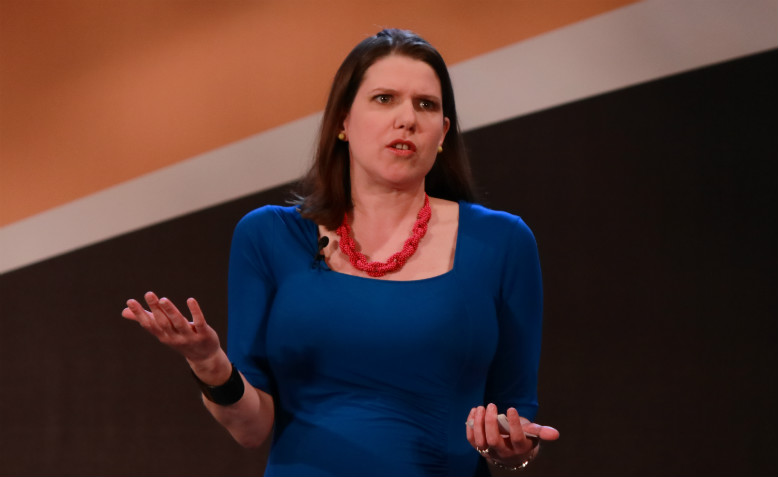 Jo Swinson. Photo: Flickr/Liberal Democrats
Jo Swinson. Photo: Flickr/Liberal Democrats
For the Liberal Democrats, a no deal Brexit seems preferable to a left wing Labour government under Corbyn, argues Alex Snowdon
Jeremy Corbyn’s appeal to Opposition MPs, beyond the Labour Party, to unite behind a brief Corbyn-led caretaker government – followed by a delay of the Brexit departure date and a general election – has been rejected by the Lib Dems. This exposes Jo Swinson’s party for what it is: a party so hostile to a Corbyn-led government, even a short-lived one, that it will effectively allow the Tories to pursue a disastrous ‘no deal’ Brexit.
Corbyn’s proposal has a number of elements to it. Firstly, as widely established already, the plan to hold a ‘no confidence’ vote in the House of Commons. This will be as soon as possible after MPs return from their summer recess on 3 September. It is a necessary first step in bringing down the current government and also in stopping Boris Johnson’s right-wing version of Brexit, which will almost certainly be ‘no deal’, happening on 31 October.
Holding a ‘no confidence’ motion has broad backing, likely from some dissident Tory MPs as well as the opposition parties and groupings, and would stand a good chance of passing. Assuming that happens, the next stage in Corbyn’s proposal is that he – as current Leader of the Opposition – assumes the leadership of a brief caretaker government. This would do two things: request an extension to the EU departure date from the EU, and call a general election.
Corbyn’s proposal has had a mixed response from the potential partners in such an initiative: SNP, Plaid Cymru, ChangeUK and independent MPs as well as the Lib Dems. The pledge to request an extension should be a unifying proposal for any MPs determined to prevent Johnson’s version of Brexit. It is the only viable way of stopping that happening.
Such a commitment should definitely be unifying when we consider that Corbyn is encouraging the possibility of a second referendum, including a clear option to remain in the EU. He says that Labour will campaign, as part of its general election platform, for another referendum.
In this context, the Lib Dems’ rejection of the proposal is outrageous and makes a mockery of any talk of their inclusion in a ‘progressive alliance’. Corbyn has, intentionally or not, called their bluff. The party that propped up David Cameron’s Tories in government for five years has not changed one bit. They are willing to risk a ‘no deal’ Brexit going ahead on 31 October if the alternative is Jeremy Corbyn spending any time in 10 Downing Street.
There has been speculation in the last couple of weeks about an undemocratic stitch-up of a ‘government of national unity’. This is an attempt by some backbenchers on Labour’s right wing, together with the minor opposition parties, to follow up a ‘no confidence’ vote with a brief government that delays EU exit while marginalising the twice-elected leader of the Labour Party.
This would strengthen centrist forces and weaken the left, while being a gift to Boris Johnson who wants to characterise his opponents as a disconnected elite opposed to the will of the people. Corbyn’s new proposal has the merit of shifting the debate and correctly asserting that Labour, led by Corbyn, must play a big role in shaping what happens next. Corbyn leads a party of half a million members that took 40% of the popular vote at the last election, doing well enough to deprive the Tories of a majority.
This does not mean that the proposal is without its problems and dangers. Labour risks alienating many of those voters who backed Leave in the 2016 referendum by committing to an extension of the deadline beyond 31 October. This is made still more perilous by the pledge to campaign for a new referendum in any general election.
That pledge has largely been forced upon Corbyn by enormous pressure, especially from within his parliamentary party, but it is a mistake. It makes it more likely that Brexit will continue to dominate British politics, crowding out the big issues that Labour needs to focus on to win an election, and serve as a point of division. It can boost right-wing pro-Brexit forces, both inside the Tory Party and outside it (notably Nigel Farage’s Brexit Party and potentially also far-right street movements).
It also allows Johnson’s government to pose as the champions of the people’s will against a parliamentary stitch-up to prevent Brexit going ahead. This is indeed the government’s immediate response today to Corbyn’s proposal and the reactions to it. Labour would be on stronger ground if it called simply for a general election, without raising the spectre of a re-run referendum. An election is what is needed to potentially break the Brexit impasse and, even more importantly, bring an end to Tory rule and get a socialist into Downing Street.

